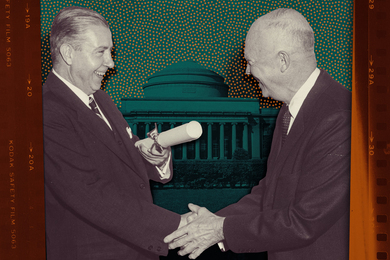A Kauffman Foundation study released today demonstrates the critical role universities play not only in fostering innovation and entrepreneurial growth, but in stimulating the much-needed recovery in regional and global economies.
According to the study, "Entrepreneurial Impact: The Role of MIT," which analyzes the economic effect of MIT alumni-founded companies and its entrepreneurial ecosystem, if the active companies founded by MIT graduates formed an independent nation, their revenues would make that nation at least the 17th-largest economy in the world. Within the U.S., these companies currently generate hundreds of billions of dollars and hundreds of thousands of jobs to regional economies, particularly those in Massachusetts and California. Globally, a less conservative estimate of their annual world sales would equal $2 trillion, producing the equivalent of the 11th-largest economy in the world.
"MIT's significant economic impact is of particular interest because it provides an important model for universities interested in helping their students become more effective entrepreneurs," said Lesa Mitchell, a vice president of the Kauffman Foundation.
"Entrepreneurial Impact" was conducted by Edward B. Roberts and Charles Eesley of the MIT Sloan School of Management, and is based on a 2003 survey of all living MIT alumni, with additional detailed analyses, including recent verification and updating to 2006 of revenue and employment figures. The study was released at a briefing on Capitol Hill today hosted by the Policy Dialogue on Entrepreneurship, whose mission it is to advance innovation and catalyze economic growth beyond "small business" to debates on science, technology, engineering and research.
The overall MIT entrepreneurial environment, consisting of multiple education, research and social network institutions, contributes to this outstanding and growing entrepreneurial output. Highlights of the findings include:
- An estimated 6,900 MIT alumni companies with worldwide sales of approximately $164 billion are located in Massachusetts alone and represent 26 percent of the sales of all Massachusetts companies.
- 4,100 MIT alumni-founded firms are based in California, and generate an estimated $134 billion in worldwide sales.
- States currently benefiting most from jobs created by MIT alumni companies are Massachusetts (estimated at just under one million jobs worldwide), California (estimated at 526,000 jobs), New York (estimated at 231,000 jobs), Texas (estimated at 184,000) and Virginia (estimated at 136,000).
"We found that the MIT alumni-founded companies have a disproportionate importance to their local economies because so many of them are manufacturing, biotech, software or consulting firms that sell to national and world markets," said Edward Roberts, founder and chair of the MIT Entrepreneurship Center.
Another reason MIT is so important to the Massachusetts economy, the study reports, is that without MIT, most of these companies never would have been located in Massachusetts. Most of the MIT alumni companies in Massachusetts were founded by former students who came to the state to attend MIT, liked what they saw, and eventually started their companies there. Less than 10 percent of all MIT undergraduates grew up in the state, but approximately 31 percent of all MIT alumni companies are located in Massachusetts.
Not only do MIT alumni, drawn from all over the world, remain heavily in Massachusetts, but their entrepreneurial offshoots benefit the state and country significantly. More than 38 percent of the software, biotech and electronics companies founded by MIT graduates are located in Massachusetts, while less than 10 percent of arriving MIT freshman are from the state. More than half of the companies started by MIT's foreign-student alumni are located in the U.S., creating their primary employment and economic impacts here.
About the Kauffman Foundation
The Ewing Marion Kauffman Foundation is a private nonpartisan foundation that works to harness the power of entrepreneurship and innovation to grow economies and improve human welfare. Through its research and other initiatives, the Kauffman Foundation aims to open young people's eyes to the possibility of entrepreneurship, promote entrepreneurship education, raise awareness of entrepreneurship-friendly policies, and find alternative pathways for the commercialization of new knowledge and technologies. It also works to prepare students to be innovators, entrepreneurs and skilled workers in the 21st century economy through initiatives designed to improve learning in math, engineering, science and technology. Founded by late entrepreneur and philanthropist Ewing Marion Kauffman, the Foundation is based in Kansas City, Mo. and has approximately $2 billion in assets.
About the MIT Entrepreneurship Center
Launched in 1996, the MIT Entrepreneurship Center provides content, context, and contacts that enable entrepreneurs to design and launch successful new ventures based on innovative technologies. The center does this by giving MIT students, alumni, and colleagues access to an array of educational programs, networking opportunities, technologies, and resources, both at MIT and around the world.
About the Policy Dialogue on Entrepreneurship
The Policy Dialogue on Entrepreneurship (PDE) is an initiative of the Public Forum Institute to promote a greater understanding of the public policies necessary to stimulate an environment conducive to entrepreneurial growth - whether on a local, national or global level. Integrating academics, researchers, policymakers, entrepreneurs, and others interested in the innovation economy, PDE is facilitating the creation of a network to further the understanding of the overall impact of entrepreneurship. Made possible by a grant from the Ewing Marion Kauffman Foundation, PDE has expanded the discourse about how to best advance innovation and catalyze economic growth beyond "small business" to debates on science, technology, engineering and research. More information is available at http://entrepreneurship.mit.edu/impact.php.
A version of this article appeared in MIT Tech Talk on February 25, 2009 (download PDF).





